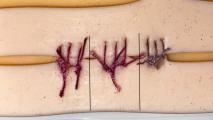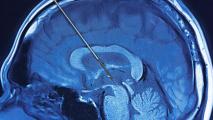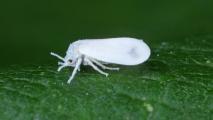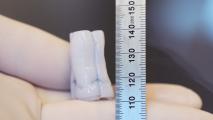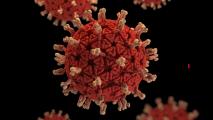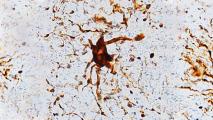
Biotech
Human history has been all but defined by death and disease, plague and pandemic. Advancements in 20th century medicine changed all of that. Now advancements in 21st century medicine promise to go even further. Could we bring about an end to disease? Reverse aging? Give hearing to the deaf and sight to the blind? The answer may be yes. And soon.
More
Argentina’s songbirds explain a mysterious type of speciation
With the help of a group of songbirds, researchers have uncovered the mystery of an evolutionary process called “sympatric speciation.”
Pfizer’s COVID-19 vaccine 100% effective in adolescent study
Pfizer’s COVID-19 vaccine was reportedly 100% effective in a trial involving more than 2,000 adolescents between the ages of 12 and 15.
New cancer treatment uses “hot blood cells” to target tumors
A new cancer treatment combining immunotherapy, photothermal therapy, and modified blood cells was highly effective in mice.
The next generation of living machines: xenobots 2.0
Made from the stem cells of a frog, “Xenobots” are tiny living machines. And researchers have just debuted version 2.0.
These color-changing sutures can catch infections
Iowa high school senior Dasia Taylor has invented color-changing sutures that can catch an infection early.
Deep brain stimulation: explained
Deep brain stimulation is being studied as a treatment for any number of neurological and psychological conditions. But what is it, exactly?
Wireless brain-computer interface moves out of the lab
A new wireless brain-computer interface was able to record and transmit brain signals as effectively as the “gold standard” wired systems.
Extreme E is bringing electric SUV racing to the ends of the Earth
With climate change and gender equity at its core, Extreme E is bringing electric SUV racing to the wild.
Therapeutic bed could help prevent brain damage in babies
Calmer is a therapeutic bed for incubators that simulates a caregiver’s breathing and heartbeat to relieve stress in newborns.
An IBM quantum computer is being built at a US hospital
An IBM quantum computer is being installed at the Cleveland Clinic as part of the organizations’ Discovery Accelerator collaboration.
Series|
Catalysts
Research grants, the silicon valley way
What if there was a way to fast-forward innovation? An economist and tech billionaire recently joined forces to make research grants available within 14 days.
This insect swiped a gene from plants to help itself survive
A plant gene has been discovered in whiteflies, marking the first known example of horizontal gene transfer of a functional gene between plants and insects.
Scientists have created a heart valve implant that grows
Children may have heart valve replacement surgery 5 or more times. A lab-grown, growing valve may change that in the future.
AI uses sound waves to read the minds of monkeys
Functional ultrasound tech can be used to map the brain activity of monkeys, suggesting it might be useful for future brain-machine interfaces.
A common virus may be the key to a COVID vaccine for young children
Researchers have reverse-engineered a common children’s virus to show the spike protein, potentially leading to a new COVID vaccine for young children.
“Zombie” cells grow in the brain after death
After death, gene expression increases in the brain’s glial cells — and those “zombie” cells could affect how we study neurological disorders.
Stunning “agar art” grows pictures with bacteria and fungi
Agar art lets scientists tap into their creative sides by growing microbes into beautiful bioart scenes in petri dishes.
Researchers have built a mini-lab for mini-brains
Researchers have created a “tiny machine” to better study brain organoids, clumps of stem cells that simulate the brain.
It's now possible to diagnose concussions with saliva
Saliva was used to diagnose concussions with 94% accuracy, suggesting that an objective concussion test may finally be within reach.
CRISPR fixes rare mutation for the first time in a live animal
For the first time in a live animal, researchers have successfully reversed a gene mutation, called a “duplication mutation,” by gene editing.
Get inspired with the most innovative stories shaping the world around us.

















